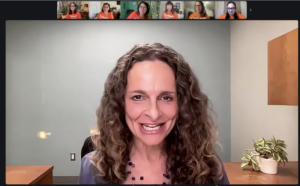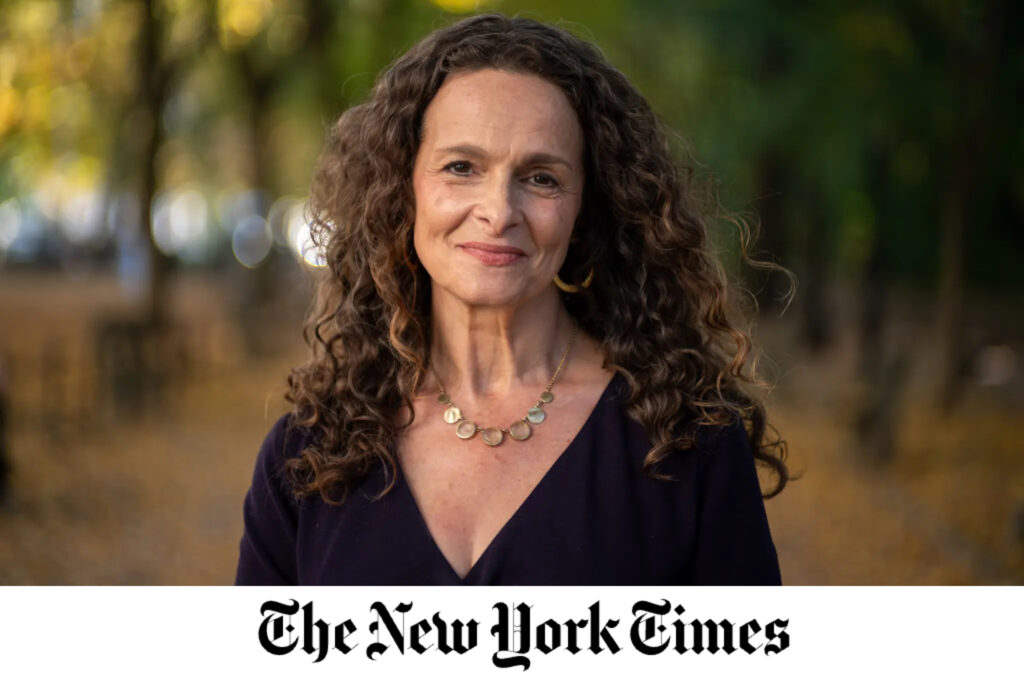Dayenu, a nonprofit group, is mobilizing Jews around a threat that organizers warn every walk of life on earth must confront: climate change.
by Cara Buckley | The New York Times | October 29, 2024
Last week, dozens of Jewish volunteers gathered on a Zoom call to prepare to call voters for a get-out-the vote campaign called Chutzpah 2024.
Between a song, a Hebrew blessing and training on how to reach low-propensity voters in Louisiana, the call’s organizer paused to share the state’s “I voted” sticker. A dapper cartoon crawfish, outfitted in a top hat, appeared on the screen.
“Obsessed with this sticker,” someone wrote in the chat.
“Not kosher,” another shot back.
The mood was jovial, but the volunteers were there to fight what many believed to be the biggest existential threat facing not just the Jewish community, but every walk of life on Earth: climate change.
The phone bank was organized by Dayenu, a nonprofit and nonpartisan group of Jewish Americans that is working to get climate-minded voters to the polls.
Dayenu is a song of thanksgiving sung at Passover, and means “it would have been enough” in Hebrew.

Rabbi Jennie Rosenn, the group’s founder and chief executive, said the name holds dual messages: “We’ve had enough” of the climate crisis, and “we have enough” to address it. The group, which says it has tens of thousands of members and social media followers, runs dozens of branches in synagogues, college campuses and other communities and is partnering with other climate and faith groups.
“Enough” has also been the cry of Jews on both sides of an often-tense divide over the Israel-Gaza war this past year. Younger Jewish voters are particularly split over Israel’s response to Hamas Oct. 7, 2023 attack, in which more than 1,200 people in Israel were killed and 250 taken hostage. The Israeli counteroffensive in Gaza has killed more than 41,000 Palestinians.
As the November election is set to be pivot point in the climate crisis, Dayenu is hoping that Jewish Americans can find common ground in the fight against global warming.
During an organizing call late last year, one volunteer wore a yellow ribbon, having just rallied for the release of Israeli hostages, while another sported a button that read “Ceasefire now,” Rabbi Rosenn said.
“This is an issue I find unites us,” said Gabby Plotkin, 25, who leads one of Dayenu’s community action circles in Chicago. “We try to welcome everyone and say, ‘I need to stay in this room and stay at table, even if I don’t agree with everyone,’ because it’s so important to work on the climate crisis domestically.”
Susan Wine Bender, 59, joined Dayenu after her climate efforts — recycling, choosing the right lightbulbs, composting — felt woefully inadequate. Still, she said that at her synagogue, Temple Shaaray Tefila on Manhattan’s Upper East Side, she has been confronted about whether the Israel-Gaza war should be the priority.
“What I say to a lot of people is, ‘What is happening there will end, because every war in human history has come to an end, but climate change will continue,’” Ms. Bender said.
Rabbi Rosenn created Dayenu in 2020 after working on social justice issues for decades, most recently with a focus on aiding refugees. The specter of tens of millions of climate refugees, increasingly dire scientific climate reports, and a heat wave in San Francisco that felt “apocalyptic” made her suddenly aware of the scope of the climate threat.
“All of these things together made me feel like, ‘Where the hell have I been?” she said.
Last spring, Dayenu helped spur the Union for Reform Judaism, the largest Jewish denomination in the United States representing more than two million Jews and 850 institutions, to divest from fossil fuels.
“They were the catalyst for action, and then we were the early adopters,” said Rabbi Jonah Pesner, the senior vice president for the Union for Reform Judaism.
If the sacred texts tell Jews to tend to the Earth and protect it for the next generation, Rabbi Pesner recalled Rabbi Rosenn saying, then “what on Earth are we doing allowing climate change to cook ourselves into oblivion?”
A September 2024 poll of Jewish voters found that climate ranked fourth in priority out of 11 issues, behind the future of democracy, abortion and inflation and the economy. Israel ranked ninth. Jewish voters aged 18 to 34 placed even greater importance on climate, putting it second behind the future of democracy.
Dayenu was designed to couple meaningful action with bolstering resilience, Rabbi Rosenn said. Its campaigns have included getting out the climate vote, helping to pass the clean energy measures in the Inflation Reduction Act, and protesting the financing of fossil fuels. It also provides members with community, rooting their work in Jewish tradition, song and teaching, and what she calls “climate Torah.”
“It’s really about what is the Torah that calls us in this existential moment that we’re in,” Rabbi Rosenn said. “How do we inspire and help people to move through the hard feelings into courageous action?”
Ms. Plotkin, the young volunteer, grew up in Colorado and was raised to see environmentalism and pursuing justice as integral to Judaism.
“My identity as a Jewish environmentalist provides a lot of nourishment and spirituality to really reinvigorate my work,” she said. “Otherwise, this can be overwhelming and exhausting.”
Ms. Bender said volunteering with Dayenu helped her feel less powerless.
For those focused on the Israel-Gaza war, she has tried to emphasize the stakes of the climate crisis. “Whatever side of the fence you’re on, we can come together to work on the planet,” Ms. Bender said. “I mean, don’t you want to pass down a better world to the next generation?”

